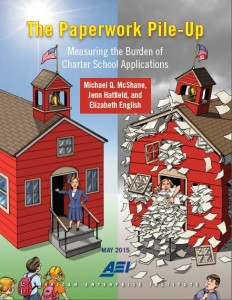Charter schools were first conceived as a bargain. Teachers (or, in the case of some of Florida’s oldest and most successful charters, parents) would receive the freedom to start new schools and experiment with different educational models. In exchange, they would face greater accountability for their academic results.
That bargain is threatened by a “paperwork pileup,” a new report by the American Enterprise Institute argues. Charter schools are startup enterprises. The more hoops they have to jump through during the application process, the fewer promising new schools will be launched. Every page added to a charter school application puts those teachers or parents at a greater disadvantage.
In practice, however, the charter bargain has become fairly one-sided. Charter school authorizers often include hundreds of tasks in the application to open a charter school, creating an onerous and lengthy process that risks freezing out potential school operators. To be sure, many application tasks are well within authorizers’ rights to require, but others are unnecessary and unduly burdensome for applicants. This is a real problem for the groups of teachers that Shanker envisioned, who might lack the time or resources to tackle these outsized applications and create new educational options for students.
In short, the report focuses on what has become a timely topic in Florida: How do you set a high bar for prospective charter schools, without creating needless barriers?
We discovered that by refocusing applications on the charter bargain, both authorizers and applicants can benefit. Almost one-fourth of the average application contains inappropriate and onerous requirements. Removing those requirements would eliminate busy- work for applicants and allow authorizers to focus on the information that is relevant to schools’ chances of future success. It would also help realign authorizing with the original intent of the charter bargain: giving charter operators autonomy in exchange for accountability.
The authors of the report surveyed the applications of charter school authorizers around the country, and identified questions that seemed inappropriate, and in some cases, ridiculous.
This helps explain why Florida created a model charter school application. It’s designed, in part, to help districts focus their questions on issues that matter, like ensuring new charter schools follow the law and develop sound educational plans.
However, some questions on the state’s model form would seem to run run afoul of AEI’s analysis. For example, it asks for charters’ transportation plans, an area the report identifies as both “onerous” and “inappropriate.” But there’s a good reason that question appears on the standard charter school application. State law says transportation should not be a barrier for parents who want to send their children for charter schools. School districts clearly have an interest in making sure new schools follow that law, though there are legal disputes about exactly what that entails.
Kathryn Mullen Upton, who oversees charter school authorizing for the Thomas B. Fordham Institute, takes issue with some of the report’s other judgments — including its critique of questions about a school’s advertising plans or decision to target a specific community. These issues are likely to be top of mind for officials in Florida school districts, since they could determine whether a proposed school can attract enough students to become financially viable and avoid a sudden shutdown early in the school year.
Yet Upton doesn’t seem to dispute the report’s opening argument that a burdensome application process can undermine a core purpose of charter schools. The report and the push-back it has received (See also: This response from the National Association of Charter School Authorizers) illustrate the difficulty of setting a high bar for school performance without compromising the flexibility at the heart of the charter school bargain.
This is why one of the ideas floated during this year’s legislative session in Florida looks promising. A charter school institute, housed in an academic setting, would be able to help teacher- and parent-driven startups develop academic and organizational plans that can clear districts’ application processes.
The institute’s purview would also include studying charter school authorizing in the state, and looking for ways it could improve. That could mean analyzing the questions districts are asking of proposed charter schools, and making sure they’re the right ones.



